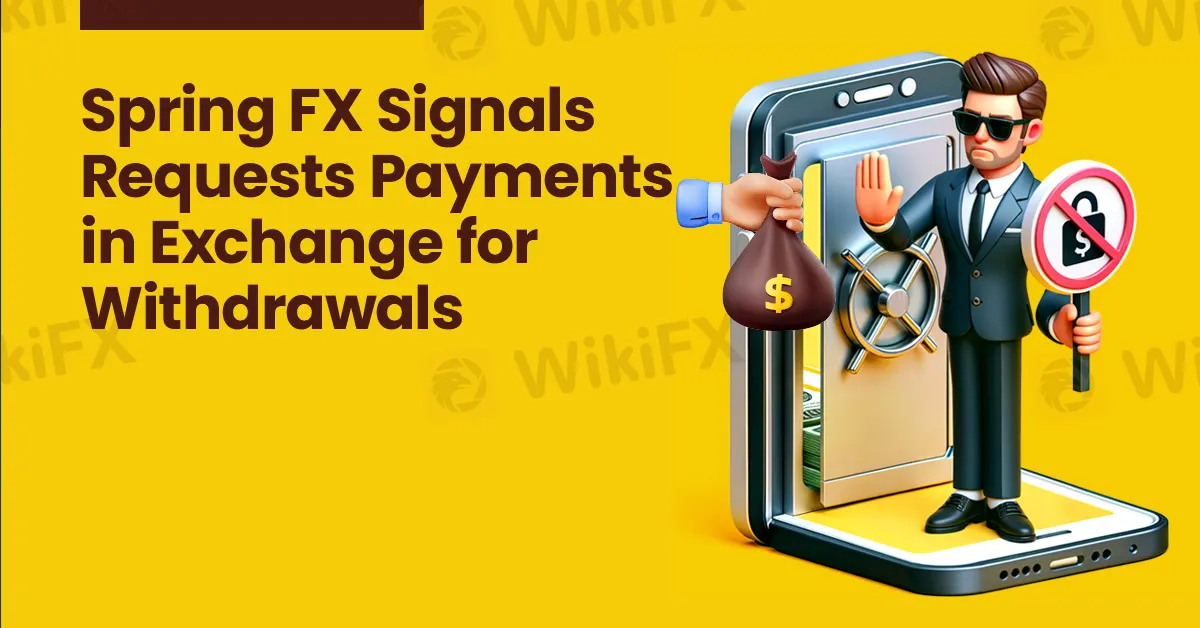简体中文
繁體中文
English
Pусский
日本語
ภาษาไทย
Tiếng Việt
Bahasa Indonesia
Español
हिन्दी
Filippiiniläinen
Français
Deutsch
Português
Türkçe
한국어
العربية
Spring FX Signals Requests Payments in Exchange for Withdrawals
Abstract:In a cautionary tale that reverberates through the digital trading landscape, Moideen, found himself ensnared in the web of deception spun by Spring FX Signals.

In a cautionary tale that reverberates through the digital trading landscape, Moideen, a 32-year-old Indian investor, found himself ensnared in the web of deception spun by Spring FX Signals. His experience serves as a stark reminder of the perils faced by those who place their hard-earned funds in the hands of unscrupulous brokers.
Moideens journey began innocently enough—an alluring Instagram post from an account named “nappy terry” caught his attention. The promise of substantial returns by a lady named Isabella Harris, lured him into the world of online trading. Following the recommendation, he invested in USDT through Bybit and channeled his funds into the Spring FX Signals platform.


Initially, Moideen tasted success—a modest $12 withdrawal from his investment. However, the euphoria was short-lived. Isabella informed him that further withdrawals hinged on additional investments. Undeterred, he injected an additional $219 into the platform.
Yet, the demands escalated. Spring FX Signals coerced him into a cycle of ever-increasing investments, culminating in a demand for $360—an amount that made him pause and question the legitimacy of the operation. Despite complying with these requests, Moideen found himself unable to access his promised profits.

Adding insult to injury, Spring FX Signals persisted in demanding more funds for the privilege of withdrawing Moideens own money. Initially asked for $219, he reluctantly complied. But when faced with a subsequent request for $350, he wisely drew the line. Unfortunately, the amount which he wished to withdraw still has not been credited into his account.


His harrowing experience underscores the need for vigilance. Traders must exercise due diligence when navigating the treacherous waters of online trading. Researching and verifying the legitimacy of brokers becomes paramount before committing any funds.
When considering engagement with any broker, thorough due diligence is essential. WikiFX stands as a global forex regulatory query platform, hosting verified information on over 50,000 brokers worldwide. Had Moideen conducted research simply by utilizing our free WikiFX broker application, he could have averted this incident. This is because WikiFX had rated Spring FX Signals with a low score of 1.11 out of 10, noting that this broker is currently operating without any legitimate license, making it an unregulated broker with a major red flag.

In conclusion, Moideen's unfortunate encounter with Spring FX Signals serves as a sobering reminder of the dangers posed by unscrupulous brokers in the online trading landscape. Let his story serve as a warning to others, urging them to remain vigilant and skeptical of promises that seem too good to be true.

Disclaimer:
The views in this article only represent the author's personal views, and do not constitute investment advice on this platform. This platform does not guarantee the accuracy, completeness and timeliness of the information in the article, and will not be liable for any loss caused by the use of or reliance on the information in the article.
Read more

The Hidden Checklist: Five Unconventional Steps to Vet Your Broker
Forex broker scams continue to evolve, employing new tactics to appear credible and mislead unsuspecting traders. Identifying these fraudulent schemes requires vigilance and strategies beyond the usual advice. Here are five effective methods to help traders assess the legitimacy of a forex broker and avoid potential pitfalls.

Doo Financial Obtains Licenses in BVI and Cayman Islands
Doo Financial, a subsidiary of Singapore-based Doo Group, has expanded its regulatory footprint by securing new offshore licenses from the British Virgin Islands Financial Services Commission (BVI FSC) and the Cayman Islands Monetary Authority (CIMA).

CFI’s New Initiative Aims to Promote Transparency in Trading
A new programme has been launched by CFI to address the growing need for transparency and awareness in online trading. Named “Trading Transparency+: Empowering Awareness and Clarity in Trading,” the initiative seeks to combat misinformation and equip individuals with resources to evaluate whether trading aligns with their financial goals and circumstances.

Malaysian-Thai Fraud Syndicate Dismantled, Millions in Losses Reported
The Royal Malaysia Police (PDRM) has received 26 reports concerning the Nicshare and CommonApps investment schemes, both linked to a major fraudulent syndicate led by a Malaysian citizen. The syndicate’s activities came to light following the arrest of its leader by Thai authorities on 16 December.
WikiFX Broker
Latest News
Top 10 Trading Indicators Every Forex Trader Should Know
ASIC Sues Binance Australia Derivatives for Misclassifying Retail Clients
WikiFX Review: Is FxPro Reliable?
Malaysian-Thai Fraud Syndicate Dismantled, Millions in Losses Reported
Trading frauds topped the list of scams in India- Report Reveals
YAMARKETS' Jingle Bells Christmas Offer!
AIMS Broker Review
The Hidden Checklist: Five Unconventional Steps to Vet Your Broker
WikiFX Review: Something You Need to Know About Markets4you
Revolut Leads UK Neobanks in the Digital Banking Revolution
Currency Calculator


